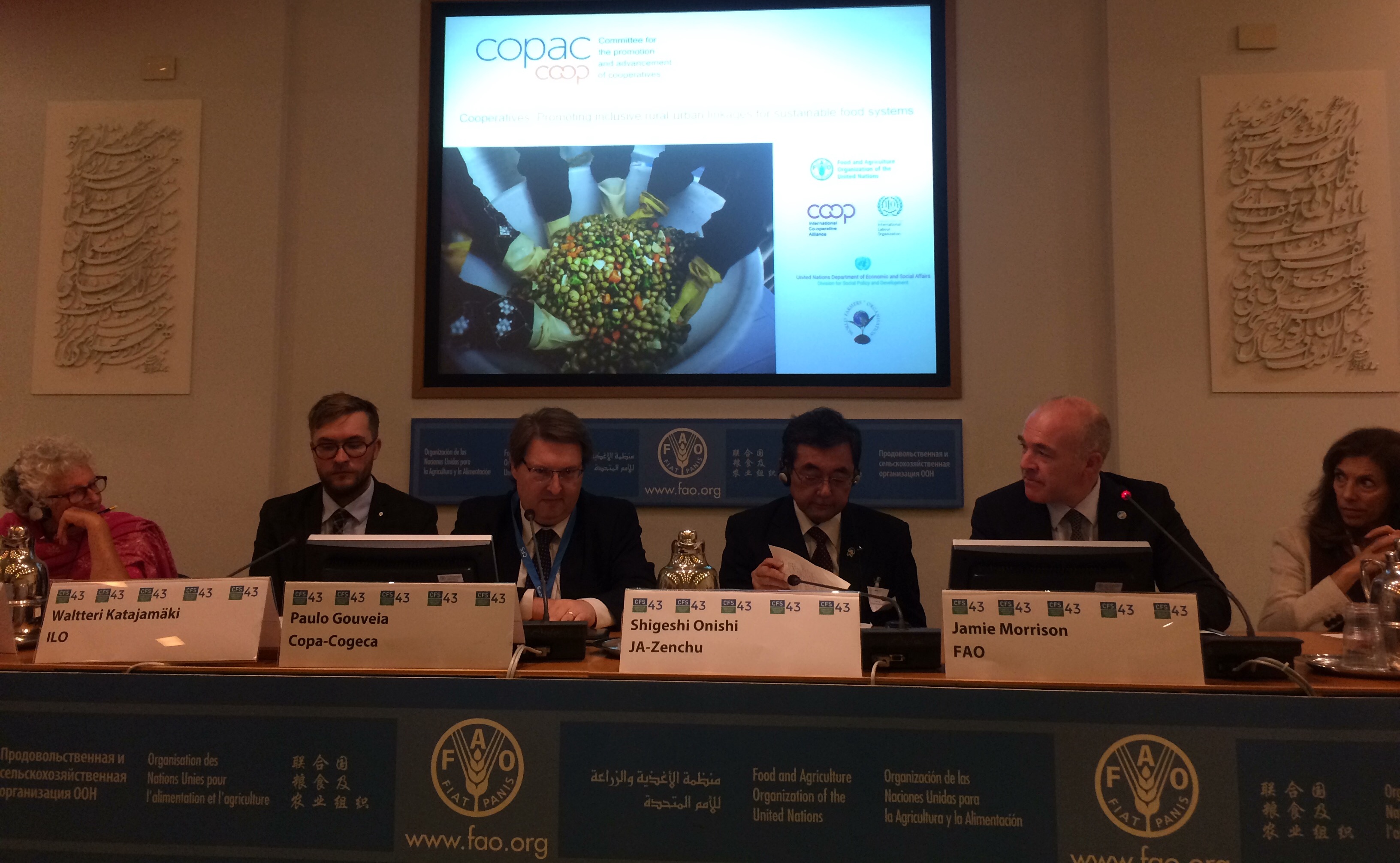At a side event of the 43rd session of the Committee on World Food Security (CFS), cooperatives were the focus of a COPAC side event on building more inclusive rural-urban linkages for sustainable food systems.
The 2016 side event was themed ‘Cooperatives: Promoting inclusive rural-urban linkages for sustainable food systems’ and took place on 21st October.
Speakers included Marcela Villarreal, Director of Partnerships, Advocacy and Capacity Development for the FAO; Shigeshi Onishi, Executive Director of the Central Union of Agricultural Cooperatives (JA-Zenchu); Paulo Gouveia, Chief Policy Advisor at Copa-Cogeca; Waltteri Katajamäki of the Cooperatives Unit in the Enterprises Department of the ILO; Judith Hitchman of the International Network for Community Supported Agriculture (Urgenci); Jamie Morrison, Strategic Programme Leader of FAO Strategic Objective 4 “Enable more inclusive and efficient agricultural and food systems”; and Maya Takagi, Deputy Strategic Programme Leader of FAO Strategic Objective 3 “Reduce rural poverty”.
Marcela Villarreal highlighted how cooperatives provide solutions for strengthened linkages between rural and urban areas that include small food producers. Cooperatives are well-suited to achieve the SDGs in all three dimensions (economic, social, environmental), based not only on their unique nature and multiple functions (economic, social, political), but also on their values of solidarity, self-help, self-responsibility, democracy and equity. Cooperatives have a dedicated role to play on both the producer and consumer sides in rural and urban areas and bring critical contributions for the transition to inclusive and sustainable food systems.
Panelists identified the following challenges for cooperatives: population aging and decline, food safety, price fluctuations, food loss and waste, climate change, resource exhaustion, shortages in supply, inputs and capital for farmers, and lack of awareness of the average consumer about how food is produced and about the cooperative difference.
Jamie Morrison said that the 2030 Agenda recognises the need for sustainable urban development and achieving food and nutrition security. Rural-urban linkages are increasingly important in this context. With growing numbers of rural and urban producers and consumers, issues relating to how food is produced, processed, distributed, consumed, and disposed of need to be addressed in inclusive and more sustainable ways. Cooperatives play an important role; however there is a need to strengthen their capacities and to consider how to establish a supportive enabling environment. Cooperatives need to be at the table when important policy decisions are made.
Shigeshi Onishi shared the concrete initiatives of JA-Zenchu to support inclusive rural-urban linkages in Japan. The cooperative hires and trains new farmers from urban areas, connects local farmers to cooperatives to sell and deliver their products, coordinates more than 2,000 farmers’ markets to link producers directly with consumers, and assists farmers with diversification into traditional processed foods (jellies, deli products, juices) that appeal to urban consumers.
Paulo Gouveia stated that farmers have a vested interest in sustainable food systems, since they are caretakers of land from generation to generation.
Waltteri Katajamäki shared the ILO’s perspective. Cooperatives help diversify rural economies, support improved availability and access of smallholders, including women and youth, to basic services (e.g. inputs, capital), and promote productive employment and decent work for rural livelihoods. There is a need for improved information and statistics on the contributions of cooperatives in promoting diversified and inclusive rural economies.
Judith Hitchman discussed how community supported agriculture, as part of the social and solidarity economy, has the potential to change the food system, through partnerships between farmers and consumers, citizen engagement, and lower ecological impact.
During the interactive discussion, Hong-chul Joo, Agricultural Adviser from the National Agricultural Cooperative Federation (NACF) in Korea, shared how the cooperative links producers and consumers through its online NHA Market. Nono Sekhoto of the African Farmers’ Association of South Africa shared the challenges of forming new cooperatives, despite their advantages, and the need to integrate producers into existing cooperative structures.
The key points from the interactive discussion included:
- More work must be done to identify and integrate smallholders into existing cooperatives, and to support strengthened organizational capacities of cooperatives, given that lack of management and governance skills and low access to capital often pose barriers that can hamper the development of cooperatives.
- Cooperatives must be autonomous and member-driven to create value for farmers.
- Cooperatives in developed countries should focus on their unique identity to increase their market share in a discount-focused food system.
- Cooperatives need to better communicate examples of engaging and inspiring youth.
The key outcomes and take away messages were summarized as follows by Maya Takagi in her closing remarks:
- Cooperatives and other forms of collective action (like community supported agriculture) link producers and consumers, resulting in shorter food value chains and benefits for their members and wider communities, such as: local, low-carbon, safe food; diversified rural economies; achieving scale and asset/risk sharing for farmers; preserving local cultures; and supporting solidarity-based partnerships between farmers and consumers.
- There is a need for increased awareness about the cooperative model and its role in supporting inclusive rural-urban linkages for achieving sustainable food systems.
- Cooperatives need to be supported in terms of their organizational capacities and with an enabling environment conducive to their development, including the establishment of legal and regulatory frameworks and policies, creation of consultation frameworks and policy dialogue spaces, as well as sound climates for investment opportunities.
- Cooperatives are strategic partners and key agents of change for building inclusive rural-urban linkages and sustainable food systems.
CFS is an international and intergovernmental platform for all stakeholders to work together in a coordinated way to ensure food security and nutrition for all. A side event on cooperatives is organised every year at CFS by COPAC.
Want more information?

